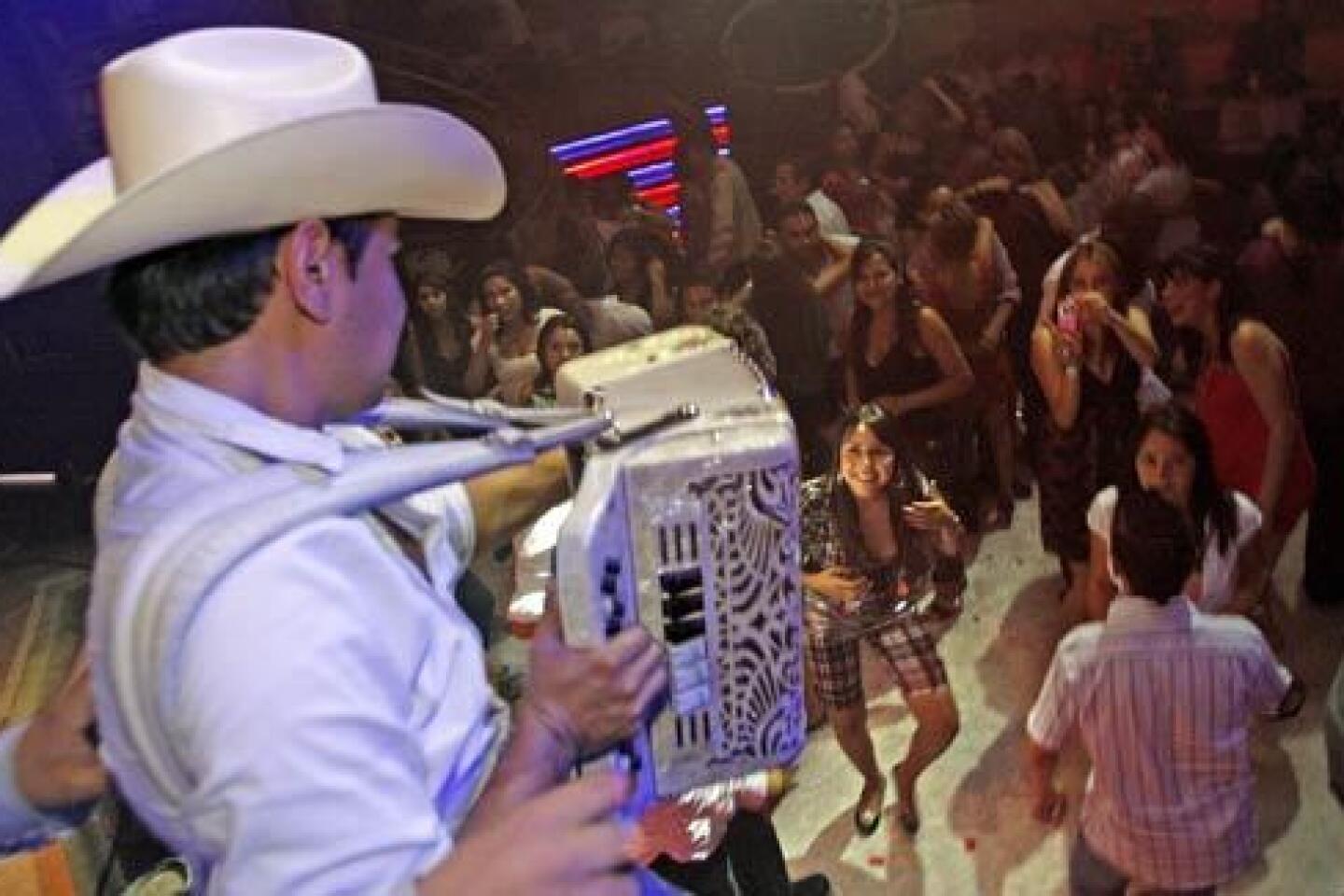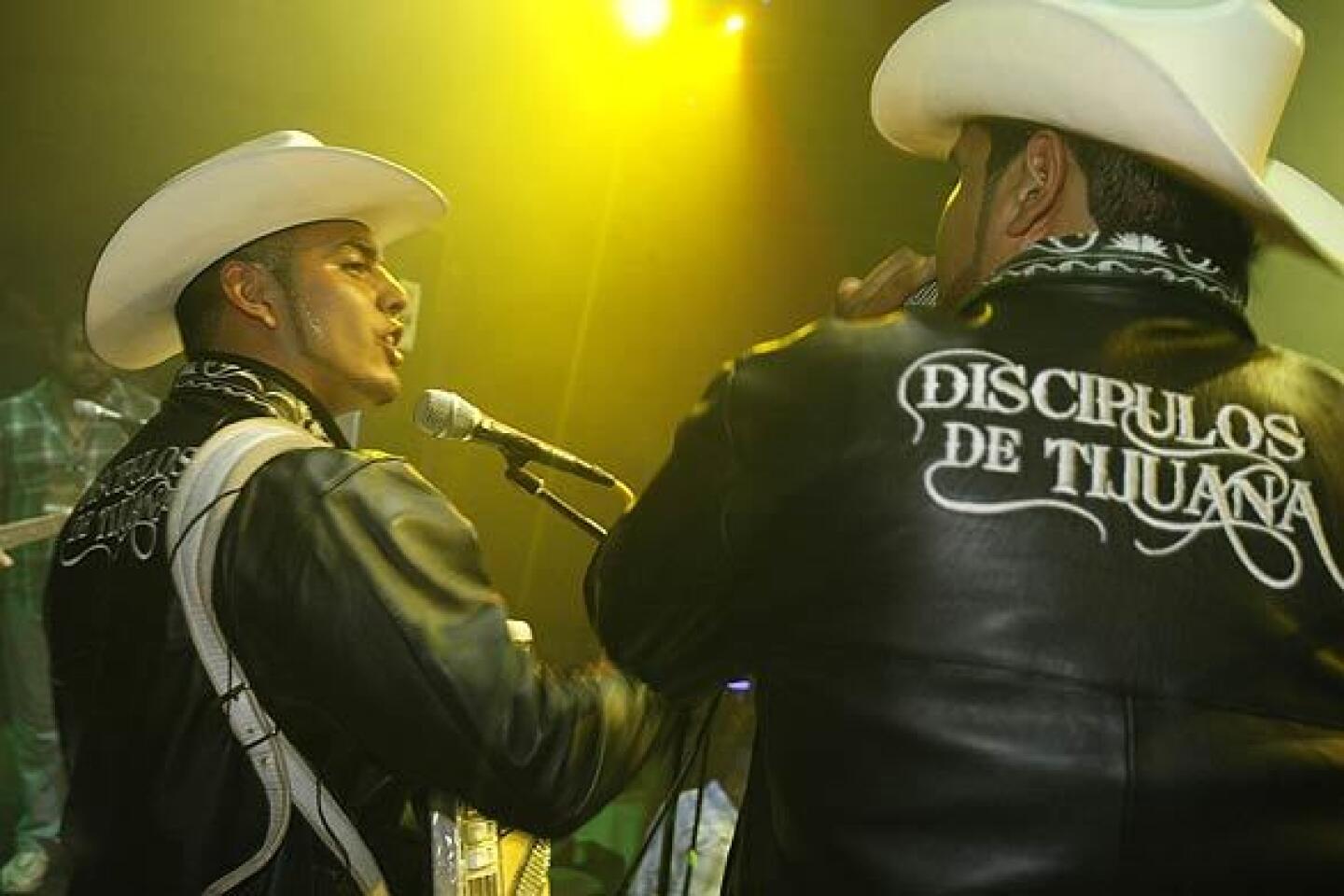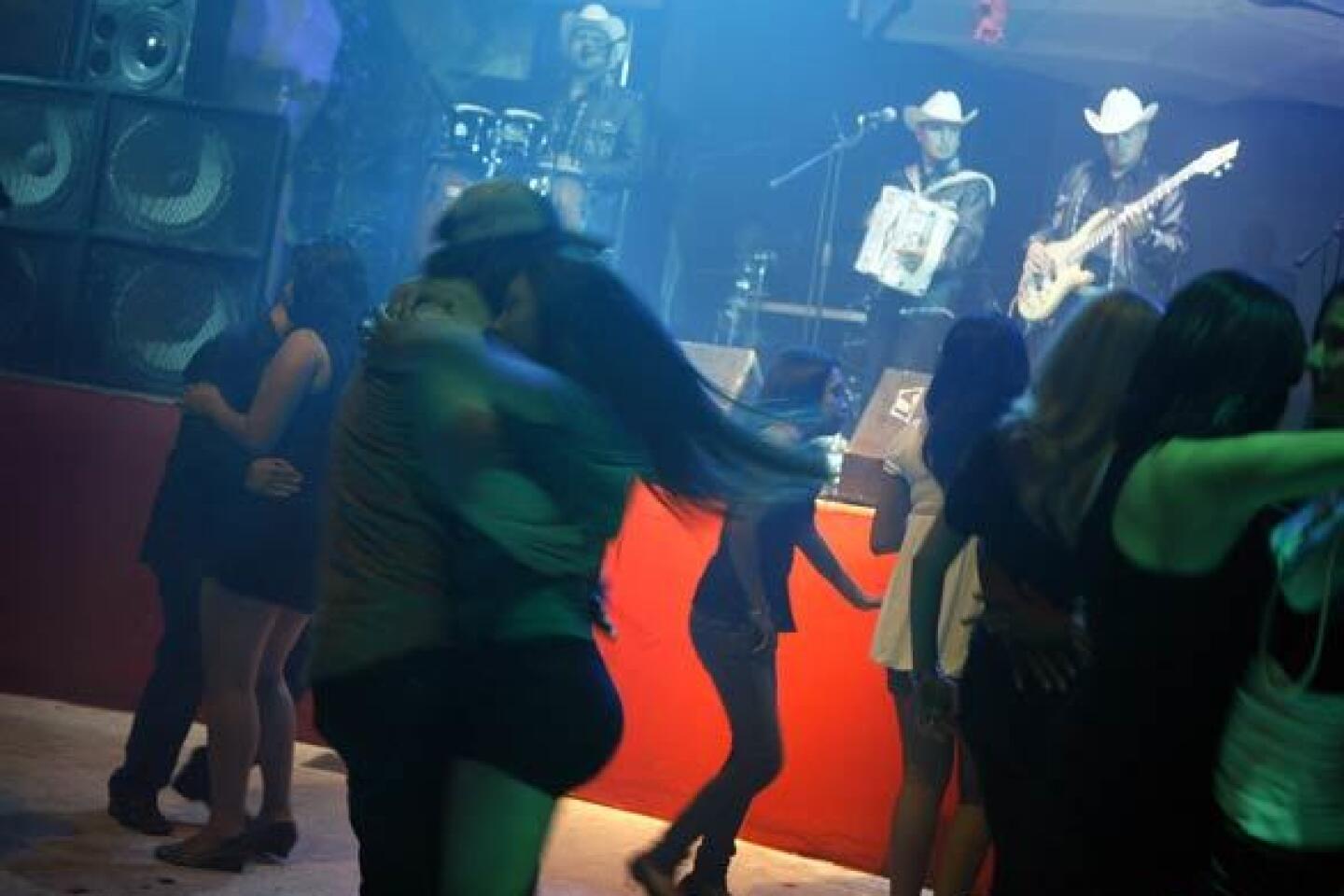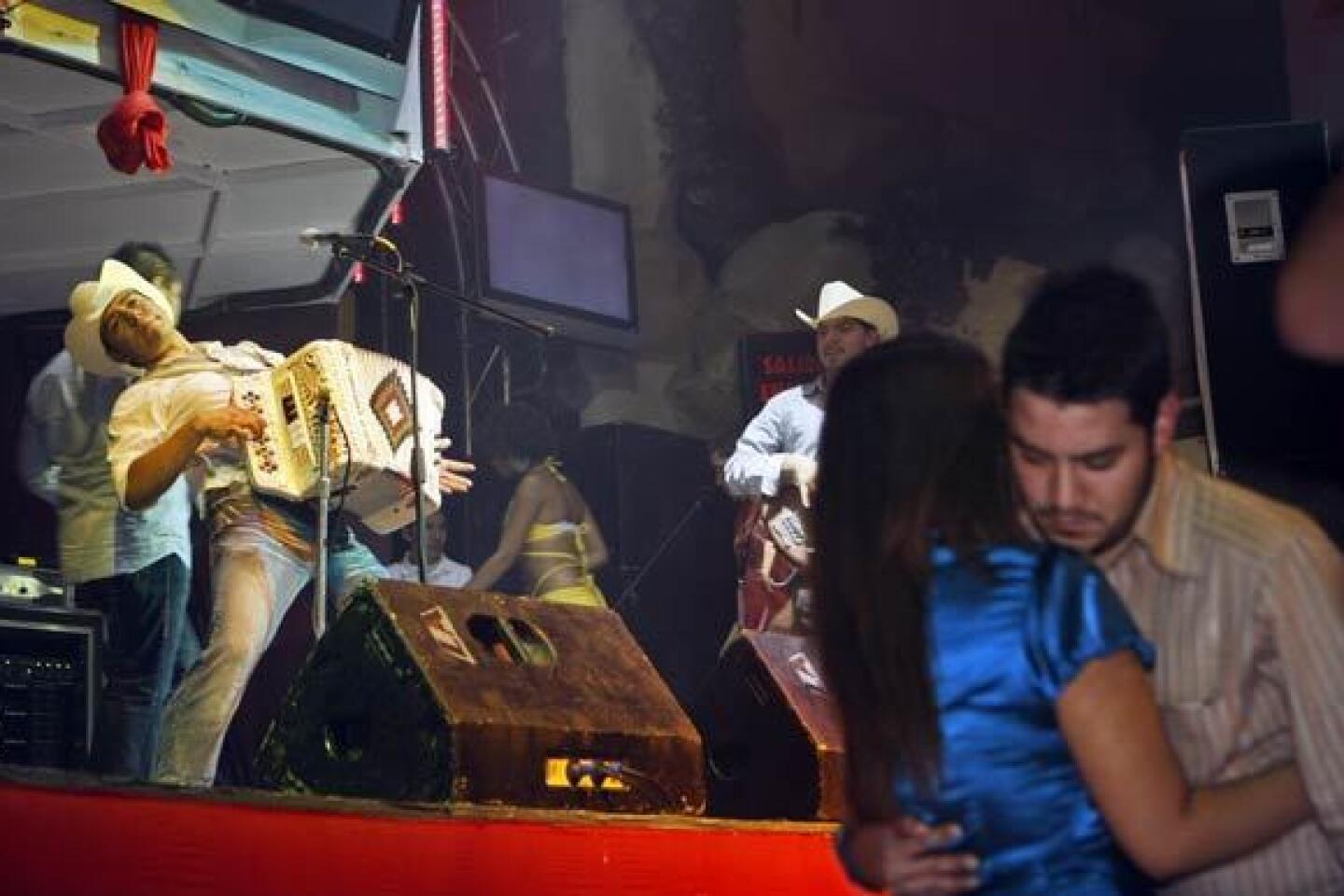Muting the music of mayhem
The whiskey is flowing at La Cantina when Calor Norteña kicks out the accordion jams for a homage to gangster Arturo Villarreal, who rose from drug cartel protege to crime boss in a six-year reign of mayhem and murder.
“The law calls me a dangerous [criminal] so don’t dare take me on because I have bullets to spare,” the band members sing, as beer-swilling youths shout and long-nailed women twirl on the dance floor.
“He was one of the top bosses, not some street dealer,” says one man, explaining why he deems the convicted racketeer worthy of a narcocorrido. “He was a powerful man.”
But the revelry proves too much for some patrons, who watch glumly or shake their heads. “It’s horrible,” says Leslie Guzman, a 25-year-old courier. “It glorifies the ugliness, the murder, the death. Everything this city is living right now. It’s so sad.”
Since drug traffickers set foot in this border city, Mexican musicians have strummed behind, chronicling their exploits in the traditional polka-based rhythms of the corrido. The sub-genre has been a soundtrack for the city, with cover bands like Calor Norteña sprinkling their repertoires with tunes about the city’s most feared gunmen. But with drug war violence and kidnappings escalating, the narcocorridos are losing their swagger.
Radio stations have stopped playing the songs and promoters have banned the music from many public events. Nightclub owners ask bands to turn down narcocorrido requests. At the cavernous Las Pulgas nightclub downtown, managers banned the music two months ago -- a decision tantamount to West Hollywood’s Whisky A Go-Go banning heavy metal hair bands in the 1980s.
Narcocorridos still draw legions of fans, despite government efforts to squelch the music. Calor Norteña played the song about Villarreal only because of repeated requests from hard-drinking bar-goers. But it was a momentary exception to a backlash that has succeeded like none before in changing people’s attitudes toward the music, say members of several bands, nightclub owners, concert promoters and government officials.
They describe a growing dislike, even revulsion, for music that critics say celebrates the people terrorizing a community that has suffered at least 207 violent deaths this year. Attendance at narcocorrido concerts has dipped; bands say audiences request the music less and less, preferring dance and romantic tunes that take their minds off the city’s troubles.
“Things are changing. . . . It’s not like in the past, when people would hear corridos and shoot their guns in the air,” said Mario Limon, the goateed accordion player for Los Linces Boyz, an ensemble that grew popular largely for singing narcocorridos. “Now, people would rather grab their girlfriends, squeeze close on the dance floor and kiss.”
Narcocorridos are rooted in Mexico’s musical story-telling tradition, which has immortalized revolutionary struggles, great romances and social movements.
Tijuana’s emergence as a hotbed of narcocorrido music paralleled the rise of the local Arellano Felix drug cartel, one of Mexico’s most powerful organized crime groups, during the 1990s.
Los Tucanes de Tijuana achieved stardom singing about hit men, bumbling U.S. agents and the rags-to-riches lives of the Arellano Felix family and other drug kingpins.
But the music of Los Tucanes is considered almost quaint compared with the songs of the new generation of bands that toast a new crop of gangsters, considered by many to be crueler and more indiscriminate in their crime sprees.
The harder-edged lyrics frequently name the gangsters (past songs spoke in more general terms) and sometimes carry threats. Recent narcocorridos glorify Jorge Briseño Lopez, known as El Cholo, a feared cartel lieutenant, and Raydel Lopez Uriarte, nicknamed Muletas, or Crutches, for allegedly leaving so many of his enemies with crippling injuries.
Blurring the lines between art and reality, some Tijuana musicians’ lives have started resembling the lives of gangsters they sing about.
In February, the body of local singer Jesus Alfaro Pulido was found in a field, wrapped in a blanket and showing signs of torture. Last November, the lead singer of Explosion Norteña, Jose Alberto Cervantes Nieto, was arrested and charged with racketeering.
Last month, all the members of Banda Nueva Clave de Oro were arrested along with about 40 other organized crime suspects after police raided a baptism celebration where they were playing. One of their songs praises a group of Tijuana police officers fired in May, in a purge of corrupt cops.
Even outside such suspicious venues, narcocorridos can prove dangerous, bringing out the worst in crowds, band members and promoters say. The alcohol starts flowing and fights break out, especially if the narcocorridos are about gangsters from rival cartels.
But turning down requests often is not a viable option. Band members say they have been threatened and beaten for refusing to play certain songs. According to one local legend, crime boss Briseño Lopez once compelled a band to play a song six times in a row, after they refused his first request.
The cartels also dangle a quick path to success to many bands, offering to pay for recording sessions, tours and clothing.
“As a musician, you learn to know what’s going on,” said a member of one band who declined to be identified for fear of retribution. “You’ve got to be careful of who offers you fame. . . . It seems tempting at first. But there are consequences that come along with it.”
The current campaign against narcocorridos began in April, after a bloody shootout here between rival gangs claimed the lives of 14 gunmen. Baja California Gov. Jose Guadalupe Osuna Millan asked radio stations to stop playing the music because, he said, it contributes to the crime problem.
“It was a call to citizens to reject narcocorridos and the culture of violence,” said Maria Elena Rodriguez, the state deputy secretary of public security. “They glorify the gangster lifestyle. They tell kids: With guns you can gain riches.”
But fans and other observers scoff at claims that the music turns fans into addicts or gangsters. For many, especially poor or working-class residents living on society’s margins, the music’s rebel spirit gives voice to frustrations and skepticism toward a government that facilitated the rise of the cartels and is believed to be either too inept or too corrupt to control the chaos.
“Corridos tell the truth,” said Juan Tenorio, a 63-year-old retiree shopping for corrido recordings at a swap meet. “There are many other bad guys: the government. America’s appetite for drugs, corrupt cops.”
Whether true or mythical or a mix of both, narcocorridos for now are being muted.
The Pancho Villa bar, the most notorious narcocorrido venue, is a no-go zone for many fearful citizens after a cop was fatally shot there last year. Over at Las Pulgas downtown, DJs dealing with narcocorrido fans direct them to signs prohibiting the music. The only corrido music allowed now can’t reference the gangster lifestyle. DJs call them Corridos Lite.
On a recent Friday night, about 300 people, among them teenage girls in mini-dresses and middle-aged men in cowboy hats, gathered at the Rock Disco for a battle of the bands. In the past, such contests would feature song after song about the Tijuana criminal underworld.
But most of the bands instead played rancheras, cumbias and other dance tunes, with no complaints from the audience.
“We’re not playing any tonight,” said Gerardo Espericueta, the 19-year-old accordion player for Los Plebes de Tijuana. “Our music is going in a different direction. We prefer playing romantic songs.”
More to Read
Start your day right
Sign up for Essential California for news, features and recommendations from the L.A. Times and beyond in your inbox six days a week.
You may occasionally receive promotional content from the Los Angeles Times.











